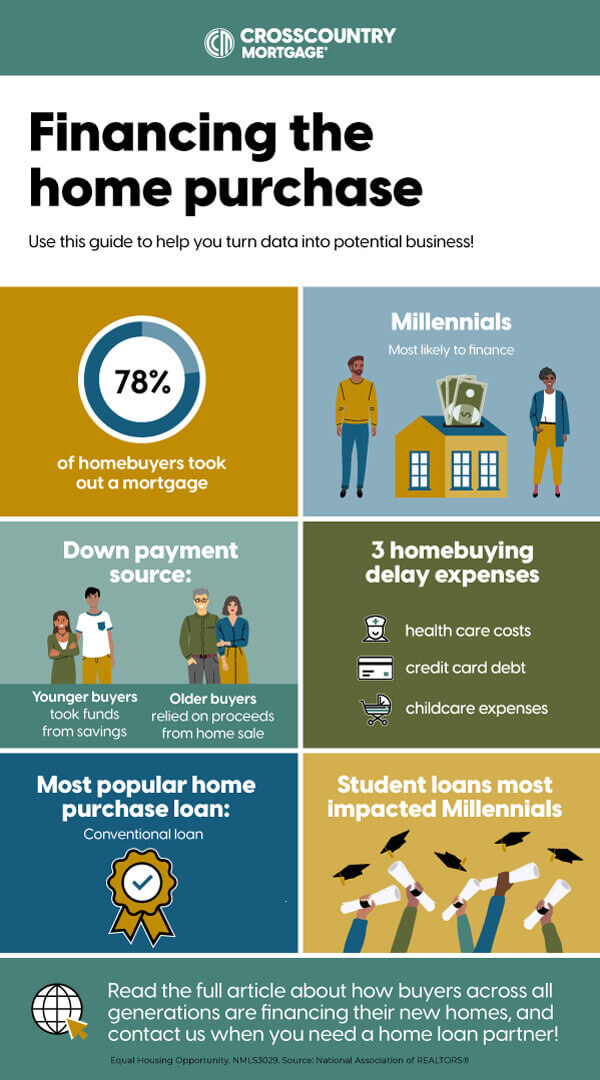In 2013, the National Association of Realtors® (NAR) started producing an annual report on buying and selling trends across generations. It’s full of good information, but it’s also 130-plus pages long. We’re sharing highlights from the 2023 report to save you from the search. (If you want to read the full report, there’s a link at the end of this article.)
Unless you’re independently wealthy, or someone really likes you, you’ll need a mortgage to buy a home. You have a lot of company. The majority of homebuyers in the NAR report used a home loan. Let’s dive into more home financing information. And if you’re not sure it’ll be that interesting, wait until you want to buy a home.
Buyers who financed their home purchase
78% of all homebuyers took out a mortgage. Millennials were the most likely to finance, at 94% for Younger Millennials (24-32 years old), and 93% for Older Millennials (age 33-42). Fewer than half of Older Baby Boomers (68-76 years old) and the Silent Generation (77-97 years old) needed mortgages. Given their ages, this group had the most time to build up equity in their previous homes or accumulate wealth in other ways, allowing them to pay cash. Many may also have been downsizing into a smaller, less expensive home.
Sourcing a down payment

So, where do buyers get the money for a down payment? Younger buyers took their funds from savings, older buyers relied on the proceeds from the sale of their primary residence. Younger buyers were also more likely to receive gift funds from a relative, friends, or parents. The ‘rents may love you, but they have plans for your room.
Down payment delays
Debt caused the biggest delays for Older Millennials and Gen X (43-57 years old). 41% of each of those age groups were delayed from making a home purchase or saving for a down payment by more than five years. The good news is that since this is a report about home purchasers, they did finally buy a home.
The top three specific expenses that caused delays for all buyers were childcare expenses, health care costs, and credit card debt, although childcare expenses were only reported by Millennials and Gen X. If we break out Millennials alone, they were most affected by student loans. More on that later.
Making sacrifices to save
Younger homebuyers were the most willing to give up fun expenses to become homeowners. Although the report doesn’t single out individual items (we see you, expensive coffee drinks), it does break out categories. Topping the list were luxury or non-essential items. 45% of Younger Millennials just said no to the treats and yes to the nest. They also were the most likely to cut their entertainment spending and the amount they spent on clothes. At the other end of the generations, at least 75% of all Baby Boomers and the Silent Generation said they made no sacrifices for their home purchase. Something to look forward to as you age!
The impact of student loan debt
Millennial buyers carried the most student loan debt. It was mentioned by 35% of Younger Millennials and 30% of Older Millennials. Those Older Millennials were also the group with the highest median amount owed, at $40,000. While only 3% of Older Baby Boomers reported student loan debt, and 58% of them owed less than $10,000, 33% of them said their debt was an eye-watering $75,000 or more.
Loan types
If you had to guess the most popular type of home purchase loan, would you say conventional? You’d be right. Conventional loans were by far the most popular form of financing across all generations. If you’re wondering what makes a loan conventional, it’s easier to tell you what doesn’t. Conventional loans are mortgages that are not backed by a government entity, like the Federal Housing Administration (FHA), Department of Agriculture (USDA), or Department of Veterans Affairs (VA). One interesting finding was that 3 to 10% of all buyers younger than the Silent Generation didn’t know what kind of loan they had, while 100% of these elders knew. Quick: If you have a mortgage, what type is it?
The mortgage process

While only 5% of all buyers had their loan application denied, it’s a big disappointment when you want to buy a home. That’s why talking to a loan originator before you start looking at houses is a good idea. The biggest reason for denials was a debt-to-income ratio that was too high. What we’re happy to report is that 71% of all buyers found the mortgage application and approval process easier than expected or no more difficult than expected. Helping you understand what to expect and making the process as smooth as possible are the hallmarks of a good loan originator.
We’re ready to finance your next home purchase, refinance, renovation project or new construction. Contact us.
About the National Association of Realtors® Generational Trends Report
The National Association of Realtors® 2023 Home Buyers and Sellers Generational Trends Report was researched and written by the National Association of Realtors® Research Group. It’s based on data gathered from primary residence homebuyers who purchased their properties between July 2021 and June 2022. For more information or to see the full report, visit https://www.nar.realtor/research-and-statistics





Unsure if something will affect your loan approval process?
Let us know your concerns as soon as possible and we will answer your questions!